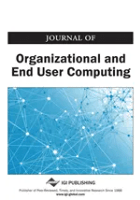
Journal of Organizational and End User Computing
Scope & Guideline
Bridging Digital Interfaces with Organizational Strategies
Introduction
Aims and Scopes
- Technology Adoption and Impact:
Research in this area examines how organizations adopt new technologies, including artificial intelligence, big data analytics, and cloud computing, and the subsequent effects on operational efficiency and user engagement. - Decision-Making in Digital Environments:
This focus area explores the processes and frameworks organizations employ to make data-driven decisions, particularly in the context of e-commerce, financial management, and risk assessment. - User Experience and Interaction Design:
The journal addresses how end-user computing and interaction design affect user satisfaction, trust, and engagement in digital platforms, including social media and e-commerce. - Innovative Management Practices:
Research on innovative management practices, including leadership, knowledge management, and employee engagement strategies, especially in the context of digital transformation and remote work. - Sustainability and Ethical Considerations in Technology:
The journal emphasizes the importance of sustainable practices in technology use and the ethical implications of digital innovations on society and organizations.
Trending and Emerging
- Artificial Intelligence and Machine Learning Applications:
There is a growing focus on the application of AI and machine learning in various organizational contexts, particularly in enhancing decision-making, customer engagement, and operational efficiency. - Data-Driven Decision Making:
Research emphasizes the importance of big data analytics in shaping organizational strategies, with studies exploring how organizations leverage data insights for competitive advantage. - Digital Transformation Strategies:
Emerging studies are investigating how organizations navigate digital transformation, including the challenges and opportunities presented by new technologies and remote work environments. - User-Centric Design and Experience:
An increasing emphasis on user experience and engagement in digital platforms highlights the importance of designing systems that meet user needs and foster trust. - Sustainability and Social Responsibility in Technology Use:
There is a rising interest in how organizations can leverage technology to promote sustainability and address social responsibility, reflecting a broader societal push towards ethical practices.
Declining or Waning
- Traditional IT Management Approaches:
Research centered on conventional IT management strategies has seen a decline as organizations increasingly shift towards agile, cloud-based solutions and digital transformation initiatives. - Basic E-Commerce Models:
Studies focused on simple e-commerce models without integration of advanced technologies like AI or big data analytics are becoming less frequent, as the field demands more sophisticated frameworks. - Static Risk Assessment Models:
The prevalence of static risk assessment models has diminished in favor of more dynamic, real-time risk management approaches that leverage machine learning and data analytics. - Single-Domain Studies:
Research that focuses solely on one domain, such as finance or marketing, without considering interdisciplinary approaches is waning, reflecting a trend towards more holistic, integrated studies. - Legacy Systems Integration:
As organizations move towards modern digital infrastructures, research on legacy systems integration is becoming less relevant, with a focus shifting towards cloud solutions and digital platforms.
Similar Journals

International Journal of Mobile Human Computer Interaction
Shaping the evolution of mobile technology through insightful research.International Journal of Mobile Human Computer Interaction (IJMHCI) is a leading scholarly publication dedicated to advancing the field of human-computer interaction in mobile environments. Established by IGI Global, this journal has served as a vital platform for researchers and professionals since its inception in 2009. With a focus on innovative designs, user experience, and the evolving landscape of mobile technology, IJMHCI plays a critical role in bridging theoretical research and practical applications. Though currently categorized in Q4 within the Human-Computer Interaction category for 2023, its consistent publication across the years reflects a commitment to fostering insightful discussions among academia and industry practitioners alike. The journal is indexed in Scopus, ranking #78 out of 145 in its field, highlighting its growing influence. While it does not currently offer open access options, its valuable contributions to mobile HCI research make it an essential resource for students and established researchers striving to explore the complexities of human interaction with mobile technologies.
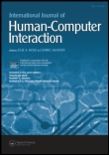
INTERNATIONAL JOURNAL OF HUMAN-COMPUTER INTERACTION
Elevating Human-Centric Design and ResearchINTERNATIONAL JOURNAL OF HUMAN-COMPUTER INTERACTION, published by Taylor & Francis Inc, stands at the forefront of research within the interdisciplinary fields of human-computer interaction, human factors, and ergonomics. Since its establishment, the journal has consistently contributed to advancing the understanding of the interactions between people and computers, making it a vital resource for researchers, professionals, and students alike. With an impressive impact factor reflecting its high citation rate, this journal is recognized as a Q1 publication in both Computer Science Applications and Human Factors and Ergonomics categories for 2023, showcasing its stature within the academic community. Additionally, it boasts a commendable ranking within the top percentiles in key areas on Scopus, ensuring that the research published here reaches broad scholarly audiences. Available in traditional subscription format, the journal covers seminal studies from 1989 to 2024, reflecting ongoing innovation in technology and its applications in everyday life, and thus serves as an essential platform for pioneering research that shapes the future of user experience.

Information Technology & Management
Advancing Knowledge in IT-Driven ManagementInformation Technology & Management, published by Springer, stands as a pivotal journal in the field of business, management, and information systems. With an ISSN of 1385-951X and an E-ISSN of 1573-7667, this esteemed journal reflects a commitment to fostering interdisciplinary research that bridges technological innovation and management strategies. Spanning from 2005 to 2024, it aims to advance the understanding of the multifaceted relationships between IT and organizational performance, making significant contributions to both academic and practical arenas. With a respectable impact as evidenced by its 2023 Quartile Rankings— Q2 in Business, Management and Accounting (miscellaneous) and Communication, and Q3 in Information Systems— the journal maintains a prominent position in Scopus Rankings, showcasing its influence and reach within the scientific community. Although it operates under a subscription model, the journal provides rich insights and practical frameworks that are crucial for researchers, professionals, and students interested in leveraging technology for management excellence. Address: One New York Plaza, Suite 4600, New York, NY 10004, United States.
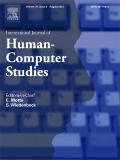
INTERNATIONAL JOURNAL OF HUMAN-COMPUTER STUDIES
Illuminating the Future of Human-Computer StudiesINTERNATIONAL JOURNAL OF HUMAN-COMPUTER STUDIES, published by Academic Press Ltd - Elsevier Science Ltd, stands at the forefront of research dedicated to the dynamic interplay between humans and technology. With a remarkable impact factor reflective of its rigorous academic standards and its prestigious ranking in the Q1 category across vital disciplines such as Education, Engineering, Human Factors and Ergonomics, and Human-Computer Interaction, this journal serves as an essential resource for researchers, professionals, and students alike. Spanning from 1994 to 2024, it showcases pioneering studies that contribute significantly to the understanding of cognitive processes, usability, and the evolving role of technology in society. Despite the absence of Open Access options, access to this journal is facilitated through institutional subscriptions, ensuring that critical findings and advancements are readily available to a global audience. By continuing to publish high-quality research, the INTERNATIONAL JOURNAL OF HUMAN-COMPUTER STUDIES plays a crucial role in advancing the field, fostering innovation, and guiding future research directions.
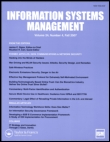
INFORMATION SYSTEMS MANAGEMENT
Empowering Scholars in the Digital AgeINFORMATION SYSTEMS MANAGEMENT is a premier academic journal published by Taylor & Francis Inc, focusing on the ever-evolving fields of Information Systems, Computer Science Applications, and Library and Information Sciences. With an impressive track record spanning over three decades since its inception in 1992, this journal is recognized in the top quartile (Q1) of its categories as of 2023, reflecting its influence and contribution to the research community. The journal holds commendable rankings in Scopus, positioned at #6 out of 280 in Library and Information Sciences, #44 out of 817 in Computer Science Applications, and #23 out of 394 in Information Systems, all showcasing its esteemed standing among peers. While the journal is not open access, it remains a vital resource for researchers, professionals, and students seeking to enhance their understanding of information systems management through high-quality, peer-reviewed articles that illuminate current trends, innovative technologies, and theoretical advancements in the field. With its dedicated commitment to scholarly excellence, INFORMATION SYSTEMS MANAGEMENT continues to be a leading platform for fostering knowledge dissemination and promoting academic dialogue.

BEHAVIOUR & INFORMATION TECHNOLOGY
Pioneering Research at the Crossroads of Behavior and Tech.BEHAVIOUR & INFORMATION TECHNOLOGY, published by Taylor & Francis Ltd, is a leading journal in the interdisciplinary field that bridges the gap between technology and human behavior. Established in 1982 and continuing through 2024, this journal has garnered a high reputation with impressive rankings in 2023 across various categories: Q1 in Arts and Humanities (miscellaneous), Q2 in Developmental and Educational Psychology, Q2 in Human-Computer Interaction, and Q1 in Social Sciences (miscellaneous). The journal's robust Scopus rankings point to its influence among peers, being placed in the top percentiles across multiple relevant disciplines. Although it does not offer open access, it remains a pivotal resource for researchers and practitioners interested in the dynamics of technology's impact on behavior. By publishing rigorously peer-reviewed research, BEHAVIOUR & INFORMATION TECHNOLOGY aims to foster insights that enhance our understanding of how information technology shapes human interactions and societal outcomes, making it a crucial publication for anyone engaged in this rapidly evolving field.

Journal of Computer Science & Technology
Unveiling groundbreaking discoveries in software development.The Journal of Computer Science & Technology, published by UNIV NAC LA PLATA, FAC INFORMATICA, serves as a vital platform for disseminating high-quality research in the expansive fields of computer science, including but not limited to Artificial Intelligence, Computer Science Applications, Computer Vision, and Software Development. Since its inception in 1999, this Open Access journal has prioritized accessibility, ensuring that groundbreaking research from Argentina and beyond reaches a global audience of scholars, practitioners, and students alike. With a broad spectrum of articles indexed in Scopus, the journal operates within the Q3 quartile across various categories, reflecting its commitment to evolving scholarship in the technology domain. Researchers interested in advancing their knowledge and contributing to the field will find the journal an essential resource for contemporary discussions and developments in computer science.

INTERNATIONAL JOURNAL OF INFORMATION MANAGEMENT
Catalyzing breakthroughs in library and information sciences since 1970.International Journal of Information Management, published by Elsevier Science Ltd, is a premier journal dedicated to advancing the field of information management and its associated disciplines. With an impressive impact factor and categorized in the Q1 quartile across multiple domains such as Artificial Intelligence, Computer Networks and Communications, Information Systems, and Library and Information Sciences, this journal stands at the forefront of research excellence. Established in 1970 and running through to 2025, it serves as a vital platform for disseminating influential research and innovative ideas within these rapidly evolving fields. The journal's rigorous peer-review process ensures that only the highest quality research is published, thereby fostering academic discourse and collaboration among researchers, professionals, and students globally. Although it does not currently offer open access, the journal provides essential access options through institutional subscriptions, making groundbreaking research accessible to a broad audience. By continually adapting to the dynamic landscape of information management, the International Journal of Information Management reinforces its significance as a leading source of knowledge and insight for those dedicated to the advancement of science and practice in this vital sector.
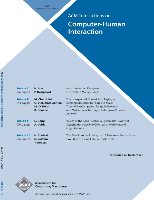
ACM Transactions on Computer-Human Interaction
Bridging the Gap Between Users and TechnologyACM Transactions on Computer-Human Interaction (ISSN: 1073-0516; E-ISSN: 1557-7325) is a prestigious journal published by the Association for Computing Machinery, focusing on the dynamic and rapidly evolving field of Human-Computer Interaction (HCI). With an impressive 2023 impact factor reflecting its high-quality research output, it proudly holds a Q1 ranking in the HCI category on Scopus, positioning it among the top journals in the field. Established in 1994, the journal has been a vital resource for researchers and professionals alike, featuring innovative studies that explore the design, evaluation, and implementation of user interfaces and interactive systems. Its broad scope encompasses various aspects of HCI, including cognitive processes, user experience design, and the social implications of technology. As an essential read for anyone involved in HCI research and practice, the journal is a gateway to advancements that shape the future of human-technology interactions. The journal is accessible to readers globally, and it plays a pivotal role in disseminating knowledge that drives excellence in software design and user interface research.
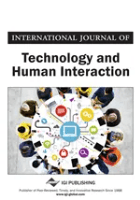
International Journal of Technology and Human Interaction
Exploring the Nexus of Technology and Human ExperienceInternational Journal of Technology and Human Interaction, published by IGI Global, serves as a critical platform for the exploration of the intersection between technology and human behavior, offering an interdisciplinary lens on topics within the realms of Human-Computer Interaction and Information Systems. With an ISSN of 1548-3908 and an E-ISSN of 1548-3916, this journal has been contributing to scholarly discourse since its inception in 2005, with ongoing publication until 2024. Hosting a diverse range of research articles, case studies, and reviews, the journal aims to advance the understanding of how technology influences human experience and interaction patterns in various contexts. Although currently positioned in the Q4 quartile of both Human-Computer Interaction and Information Systems categories, the journal fosters knowledge that aspires to redefine scope and standards within the field. Its commitment to quality research is reflected in its Scopus rankings, showcasing its relevance despite its emerging status in academia. Targeting researchers, professionals, and students alike, the International Journal of Technology and Human Interaction invites contributions that address the pressing challenges and innovations at the nexus of technology and human interaction.